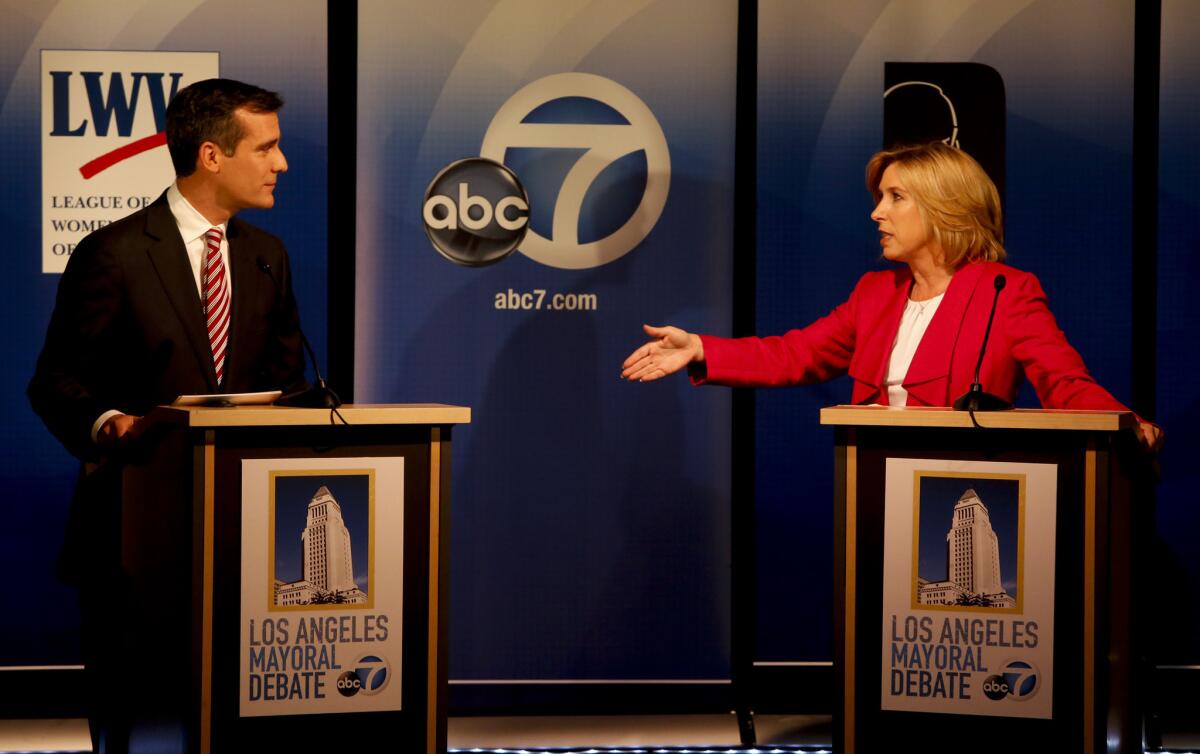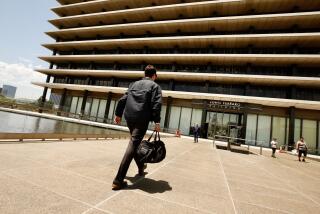DWP average pay rose 15%, despite flagging economy

Average employee pay at the Los Angeles Department of Water and Power rose 15% over the last five years, despite an economic slump that ravaged the cityâs budget, records released Tuesday show.
DWP workers received significantly more generous pay increases than other city workers, who received an average raise of 9% over the same period.
![]()
The median household income for Los Angeles residents â the public utilityâs customers â fell over roughly the same period, from $48,882 in 2008 to $46,148 in 2011, the latest year for which U.S. census numbers are available. By contrast, the average DWP pay rose from $88,299 in 2008 to $101,237 in 2012. DWP pay grew at about three times the rate of inflation in the Greater Los Angeles Area.
DWP compensation has become a central issue in the May 21 mayoral election, in which there has been much debate over whether the cityâs labor contracts are too costly given the fiscal problems that have resulted in major cuts in services.
The union representing most of the DWPâs workers has become the single biggest source of campaign cash in the race, giving $1.45 million to an independent effort backing City Controller Wendy Greuel.
The only pay growth comparable to the DWP came at the city Fire Department, where average total salary and other payments also rose 15% over the five years to $132,131. But officials note that about 300 positions were cut from the Fire Department in that period, which required increased overtime payments to fill positions.
The firefightersâ union, which is also backing Greuel, has spent about $250,000 on her campaign.
Average Los Angeles police officer pay increased by 2% over the same period, The Times analysis found.
The Times requested the DWP pay data in early February. Agency administrators repeatedly postponed the release, saying more time was needed to ensure that disclosing the information would not endanger employees.
The state of California, Los Angeles County and the city of Los Angeles routinely release their payroll with employeesâ names. Courts have allowed rare exceptions when employeesâ safety might be put in danger, such as undercover police officers and people who have restraining orders against potentially violent stalkers.
The DWP was poised to release the data last week. But the employeesâ union sued the agency, seeking more time for its roughly 8,000 members to object to the disclosure of their names. At a Los Angeles County Superior Court hearing Tuesday, the city attorneyâs office said it found 112 employees who may have restraining orders. An additional 357 are on disability leave and might not be aware of the pending release of information, Chief Deputy City Atty. William Carter told the court.
After the hearing, the union and the DWP agreed to release the pay data without names. Both sides are due in court again Wednesday to argue over disclosing employeesâ identities with their earnings.
The union may have relented because keeping the information secret has become a public relations problem, turning a once coveted political backing into a potential liability, said Jaime Regalado, professor emeritus of political science at Cal State L.A. âIt looked really bad that they were trying to block access to their incomes,â he said.
And the timing of the pay increases probably wonât play well, he said. âThe fact that they were those five years, when virtually all other city workers had to bite the bullet, it looks bad.â
The $101,237 average pay covers more than 10,000 employees, including temporary workers and full-time staffers. They range from the highest-paid engineers to line workers to customer service representatives.
DWP spokesman Joseph Ramallo attributed the pay increases to a range of factors including cost-of-living adjustments and variations in annual overtime payments.
The Times analysis found average base pay at the DWP increased 19% over the five-year period. Unused vacation time payouts for retiring employees jumped 32%. And âother payâ, which includes disability payments and compensation for unused sick time, rose 46%.
Overtime, which Ramallo said is driven mostly by responding to storm damage, was 22% lower in 2012 than it had been in 2008.
Last week, the Times reported that the DWPâs average worker pay was $99,308 in 2011, the most recent data available at the time. That was more than 50% higher than other city employees. Also, DWP employees were paid about 25% more than workers at comparable public and private utilities, according to a report commissioned by the City Council last year. In addition, agency employees receive free healthcare benefits.
The report set off a frenzy of finger-pointing by Greuel and her rival, Councilman Eric Garcetti, who blamed each other for the agencyâs comparatively high pay.
Greuel noted that Garcetti voted for two sets of DWP raises in 2005 and 2009. Garcetti pointed out that Greuel voted for the 2005 raise too, and didnât have a vote in 2009 because she left the City Council to become controller.
On Tuesday, Greuel spokeswoman Laura Wilkinson accused Garcetti of championing the ârecklessâ 2009 raise, which came at a time when city residents âcould least afford it.â In the same period, funding for firefighters and 911 emergency response service was being slashed, she said.
Garcetti spokesman Jeff Millman said the 15% raises at the municipal utility are âexactly why the DWP [union] is spending a record amount of money to buy this election for Wendy Greuel, to protect the status quo.â
Dan Schnur, director of the Jesse M. Unruh Institute of Politics at USC, said the candidates should tell voters how they would negotiate a new contract as mayor to fix the problem.
âEach candidate has been very specific about what their opponent did wrong on this issue in the past,â he said. âThese numbers should push the discussion toward what theyâll do if elected.â
Times staff writer Doug Smith contributed to this report.
More to Read
Sign up for Essential California
The most important California stories and recommendations in your inbox every morning.
You may occasionally receive promotional content from the Los Angeles Times.











